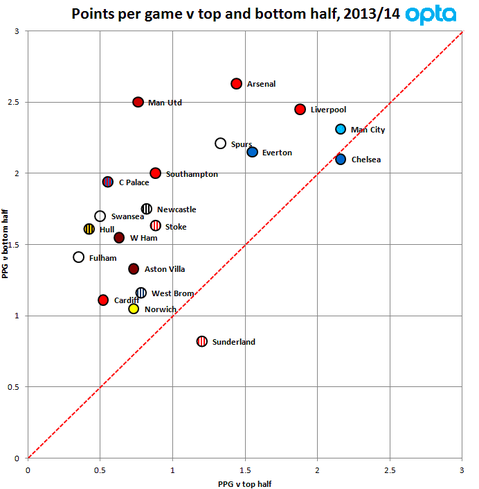By Ed Valentine
I remember way back in 2007, after Tim Harford had visited UCC to give a talk about the Undercover Economist, I had a chat with Dr Robbie Butler about why Manchester United were so successful domestically. Robbie pointed out, following a game where United drew with Arsenal, that they may not have the best record against others in the top four but they beat all of other teams week in week out. As the Red Devils have not enjoyed the best of seasons I decided to look at where the league was won and lost relative to performance within ‘mini leagues’ e.g. top four and the relegation three.
Chelsea don’t often lose at home; in fact the defeat to Sunderland was Jose Mourinho's first Premier League home defeat ever (78th home game). To some degree this result was a snapshot of each of their seasons because Chelsea and Sunderland are the two teams who have picked up more points against teams in the top half than against teams finishing in the bottom half.
Chelsea had a great record against the top four clubs in 2013/14. They did the double over Liverpool and Man city, and crushed the Arsenal 6 – 0. Despite top form against the top clubs, Chelsea struggled at times against weaker opposition, losing to Crystal Palace and drawing against Norwich.
Sunderland, who managed to avoid relegation, won a point against Man City and took victory against Man United. Their head-to-head record against the relegated clubs however, has been poor, as they managed just two wins in six games.
A figure below helps illusrate the point. The red line shows the position a team would find themselves if they won the same points per game against top and bottom half teams – Sunderland and Chelsea (tangentially) are the only sides underneath the line.

The Premier League is a competition with some degree of competitive balance. Norwich can lose 7 -1 to Man City but then draw the return game later in the season 0 – 0. There is a situation emerging however where the same three or four teams are challenging for European places and the rest are looking to avoid relegation. A mid-table doesn’t really exist and so the Premier League truly is a game of two halves.
Data courtesy of OPTA
 RSS Feed
RSS Feed